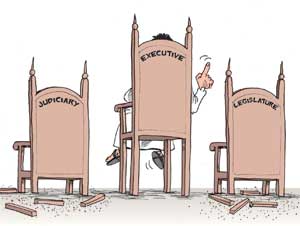Reply To:
Name - Reply Comment
Last Updated : 2024-04-19 21:46:00
 “….it does not become persons in our situation to live enjoying our own ease, and unmindful of the interests of the people…” - The Mahavamsa (68.8-13)
“….it does not become persons in our situation to live enjoying our own ease, and unmindful of the interests of the people…” - The Mahavamsa (68.8-13).jpg) It is therefore important to clarify a few ”miscommunications” that have been emanating, particularly from some Legislative Corners of government on this whole process, which is the intent and substance of this writing.
It is therefore important to clarify a few ”miscommunications” that have been emanating, particularly from some Legislative Corners of government on this whole process, which is the intent and substance of this writing. With the above excerpts in mind, we will try to discern (as laymen) how the above” separation of powers” as intended by the PEOPLE should operate when ”impeaching a judge”:
With the above excerpts in mind, we will try to discern (as laymen) how the above” separation of powers” as intended by the PEOPLE should operate when ”impeaching a judge”:
 This follows to an argument that is seen to be emanating from certain quarters of the Legislative organ of government, that “Supremacy of Parliament” is a concept operating in our Republic; it is not so, and this is clearly a misdirection of the Constitution.
This follows to an argument that is seen to be emanating from certain quarters of the Legislative organ of government, that “Supremacy of Parliament” is a concept operating in our Republic; it is not so, and this is clearly a misdirection of the Constitution.Commentator Wednesday, 28 November 2012 01:41 AM
Inherent in this article is the assumption that the impeachment process is a "judicial process". But is it? Isn't it an executive function, where the executive places a check on the judiciary? Isn't the need for approval by the legislature of a move to impeach a judge simply a mechanism to ensure that executive does not abuse this power? The problem here lies in the fact that both the executive and a majority in parliament are members of the same political party, with an obviously bias speaker, who appointed the Parliamentary Select Committee. Ideally, the PSC ought to have included members of the givernment and others in equal number.
With a neutral speaker, and a powerful opposition, the mechanism set out in the constitution seems to comply with the doctrine of separation of powers.
With a neutral speaker, and a powerful opposition, the mechanism set out in the constitution seems to comply with the doctrine of separation of powers....')" type="button" class="btn btn-outline-secondary btn-sm" style="padding-top: 0px; padding-bottom: 2px">Reply

Add comment
Comments will be edited (grammar, spelling and slang) and authorized at the discretion of Daily Mirror online. The website also has the right not to publish selected comments.
Reply To:
Name - Reply Comment
On March 26, a couple arriving from Thailand was arrested with 88 live animal
According to villagers from Naula-Moragolla out of 105 families 80 can afford
Is the situation in Sri Lanka so grim that locals harbour hope that they coul
A recent post on social media revealed that three purple-faced langurs near t